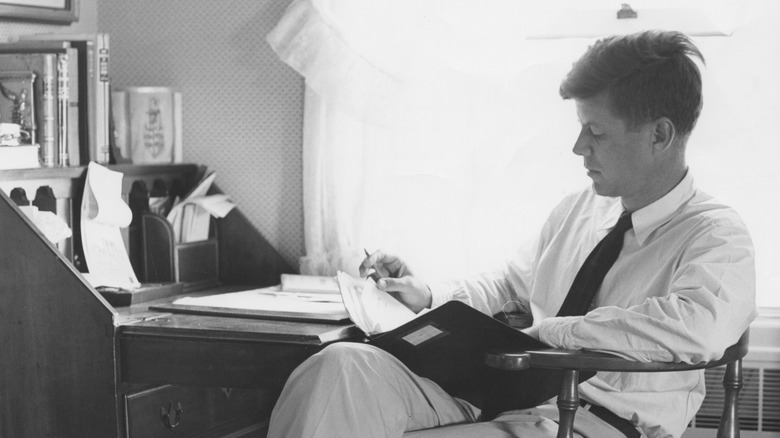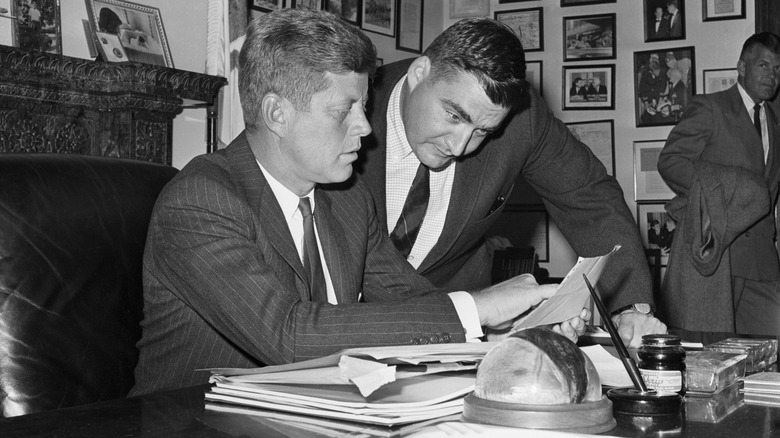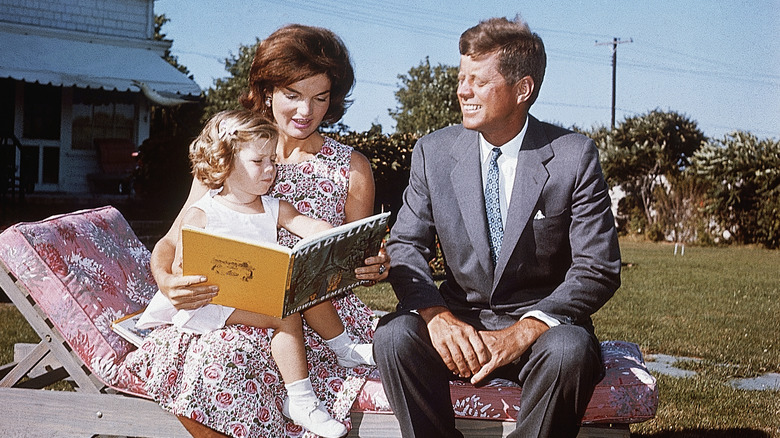JFK's Reading Speed Will Leave You Floored
Reading: that thing you're doing right now. Whether or not folks realize it, modernity affords us the chance to read more than ever — albeit in a shallow, scrolling, scattershot way. But how about real, deep, focused reading that leaves the mind clear and calm? While everyone might not sit and read for long, uninterrupted periods of time, sites like Toner Buzz say that the global book market reached a whopping $132.4 billion in 2023. Golden Steps ABA says that folks usually read 1,000 to 2,000 words per sitting, at a rate of 250 to 300 words per minute and two minutes per page. In other words: not that fast or that much, no matter how many books are bought.
Former United States President John F. Kennedy, however, was a different story. As the JFK Presidential Library and Museum cites, JFK hit about 1,200 words per minute — about four times the current average reading rate. While speed doesn't automatically equal comprehension, we can safely assume that JFK wasn't just skimming. After all, he's got some whoppers on his favorite reading list, a list that portrays his intelligence, upbringing, and inclinations. As JFK Library says, we've got biographies like, "John Quincy Adams and the Foundation of American Foreign Policy" by Samuel Flagg Bemis (1949), historical tomes like, "The Price of Union" by Herbert Agar (1950), and precisely one recognizable piece of fiction: "From Russia With Love" (1957) by Ian Fleming — the creator of 007, aka James Bond.
A dedicated, lifelong reader
It should come as no surprise that JFK's reading speed stemmed from a lifelong, dedicated reading habit. And when we say "habit," we really mean "near-obsession." As the National Park Service quotes his wife and renowned first lady, Jacqueline Kennedy Onassis, "He read in the strangest way ... He'd read walking, he'd read at the table, at meals, he'd read after dinner, he'd read in the bathtub ... He really read all the times you don't think you have time to read ... He was always reading — practically while driving a car."
JFK's love of reading started with his mother, Rose. The National Park Service says that Rose curated reading lists for her children — all nine of them. JFK, however, was the only one who obeyed the lists. The JFK Presidential Library and Museum not only lists JFK's favorite books as an adult but also his favorite childhood books. The list reads like a who's who of some of the most prominent, well-recognized children's fiction in English literature: "The Jungle Book" by Rudyard Kipling, "Treasure Island" by Robert Louis Stevenson, "Black Beauty" by Anna Sewell, and many more. There are also some more mature, well-respected works in there, like, "Uncle Tom's Cabin" by Harriet Beecher Stowe and "Pilgrim's Progress" by John Bunyan.
The National Park Service says that JFK was a sickly child diagnosed with Addison's Disease, a potentially life-threatening disease involving hormone deficiencies. Reading became the young, bedridden JFK's refuge.
Lessons in literature learned
To JFK, reading wasn't a hobby, and the goal wasn't to read fast, slow, or anything in between — no matter his 1,200 word-per-minute reading speed; reading was a way of life. When he was heading towards the Solomon Islands in the Navy during World War II he "gobbled up" adventure novels like Sir Walter Scott's "Ivanhoe," as Inc. cites. When he started courting his future wife, Jacqueline Kennedy Onassis, the Christian Science Monitor says that he gave her a copy of "Pilgrim's Way," a book about life in the trenches during World War I — Jacqueline was extremely impressed and "captivated" by the gesture.
JFK's commitment to reading didn't flag when he moved into politics. The National Parks Service says that he took a speed-reading course from 1954 to 1955 — this would have been after he'd been elected senator of Massachusetts in 1953 and gotten married that same year. A few years later in 1957, he released "Profiles in Courage," a book profiling the lives of eight different U.S. senators, and for which he won the Pulitzer Prize that same year. Christian Science Monitor says that JFK cited Ernest Hemingway's definition of courage in the book as the now-well-known phrase, "grace under pressure." All in all, it's not hard to see how JFK's love of reading not only granted him his reading speed but made him the person that he was.


